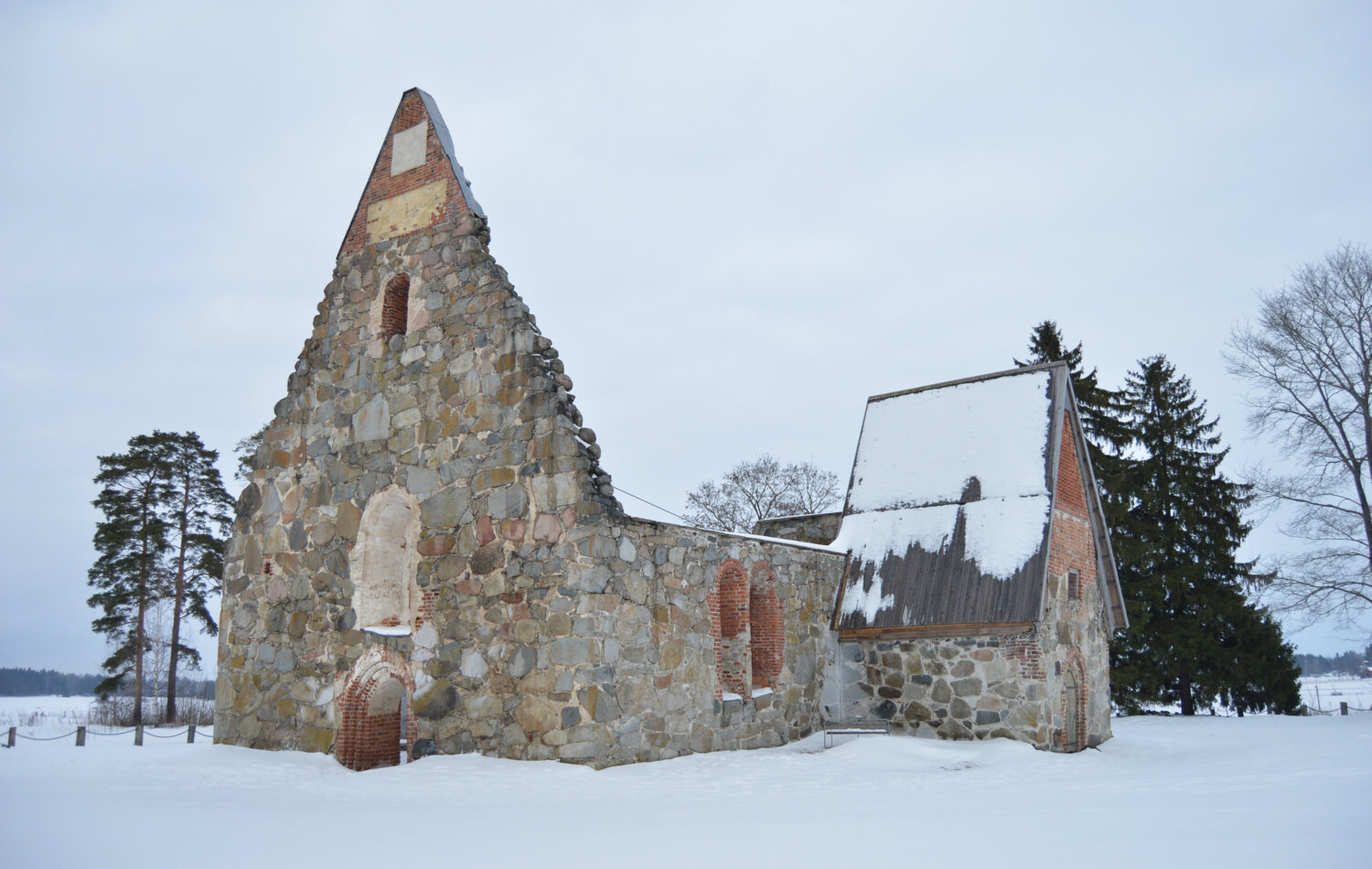Adjunct Associate Professor Eileen Pittaway and Dr Linda Bartolomei are fighting for gender equality in international refugee law and policy.
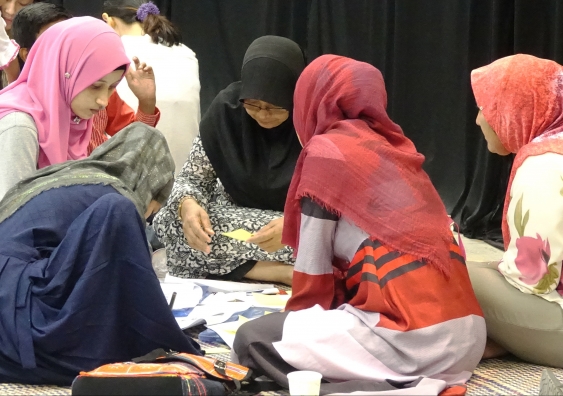
Refugee women in Malaysia doing group work during one of the researchers’ workshops. Photo: Linda Bartolomei, Eileen Pittaway
Refugee women and girls in camps on the Thai-Burma border are among the first-responders helping local communities cope with the additional challenges of COVID-19.
For many, this continues work they’ve been doing for years, drawing on their skills, knowledge and experience of conflict, flight and survival. They are supplying food, masks, soap and health information across seven refugee camps as well as providing emotional support to the most vulnerable, including survivors of sexual and gender-based violence, people with a disability and the elderly.
They are one group of women from three very different refugee sites, in Thailand, Kuala Lumpur in Malaysia, and Cox’s Bazar in Bangladesh, working with Adjunct Associate Professor Eileen Pittaway and Dr Linda Bartolomei from UNSW Arts & Social Sciences.
The experts from the UNSW Forced Migration Research Network have been funded by the Department of Foreign Aid and Trade (DFAT) to monitor the realisation of gender commitments made in the Global Compact of Refugees (GCR).
The GCR was developed by the UN High Commissioner for Refugees (UNHCR) in consultation with governments and other experts and affirmed in December 2018. It frames the need to find sustainable solutions for the world’s refugees as a shared global responsibility and provides a framework for doing this.
While the pandemic has reshaped the project, as travel to all three refugee sites has stopped, DFAT granted them permission to enable refugee women and local partner agencies to adapt programs to meet their own needs.
Refugee women on the Thai-Burma border said, “Just support us to be involved … we can do many things ourselves … with resources, we can support our sisters, offer good services… It does not have to be done for us”.
The project, Refugee Women and Girls: Key to the Global Compact on Refugees, documents and reports on its findings at key meetings of UNHCR Geneva, with support from Geraldine Doney as project manager.
Placing refugee women and girls front and centre
That “refugee women leaders are finally being recognised as key to assisting other women and girls facing the COVID-19 pandemic” represents significant progress, say A/Prof. Pittaway and Dr Bartolomei.
Their research prioritises participation from refugee women and girls on the frontline in identifying problems and solutions and in program implementation. It aims to ensure services respond to their lived experience and meet essential needs rather than less effective, albeit well-meaning, humanitarian efforts often made without consultation.
Unfortunately, large aid organisations often focus on big-picture goals. In the aftermath of the 2005 tsunami in Sri Lanka, for example, “one local woman said, ‘We need a glass of water. And they’re offering us a well in three months’ time. We’ll be dead before the well is built’,” she says.
For example, often refugee and displaced women are seeking immediate, small-scale support: with “$10 a day a woman could work miracles: buying aspirin here, filling a prescription, by coming back with a sarong for a woman who was [left] naked by the tsunami”, A/Prof. Pittaway says.
Recognising the diverse needs of displaced peoples
A/Prof. Pittaway and Dr Bartolomei have more than fifty collective years’ experience, having collaborated with refugee groups as well as academic, NGO and United Nations (UN) partners since the 1990s.
They chose the three refugee sites for their divergent socioeconomic and political contexts to test how international polices are affected by these variables. Refugees on the Thai/Burma border have been living in large camps for more than 30 years in some cases, with some starting to return to Burma, Dr Bartolomei says.
Kuala Lumpur, Malaysia is a complex setting with a diverse population of refugees – “we’re working with refugee women from 15 or so different countries” – living in an urban setting.
Malaysia’s dependence on migrant workers means there’s often a blurring of boundaries between refugees and migrant workers, she says. The possibility of working formally, and of quasi unofficially integrating, exists in Malaysia in a way that’s completely different from other refugee sites.
By contrast, Bangladesh, host to large numbers of Rohingya refugees for over 30 years, was in crisis when the project began. Almost 900,000 additional refugees crossed the border from Myanmar in a two-year period such that the Bangladesh government and humanitarian aid workers struggled to meet their most basic needs.
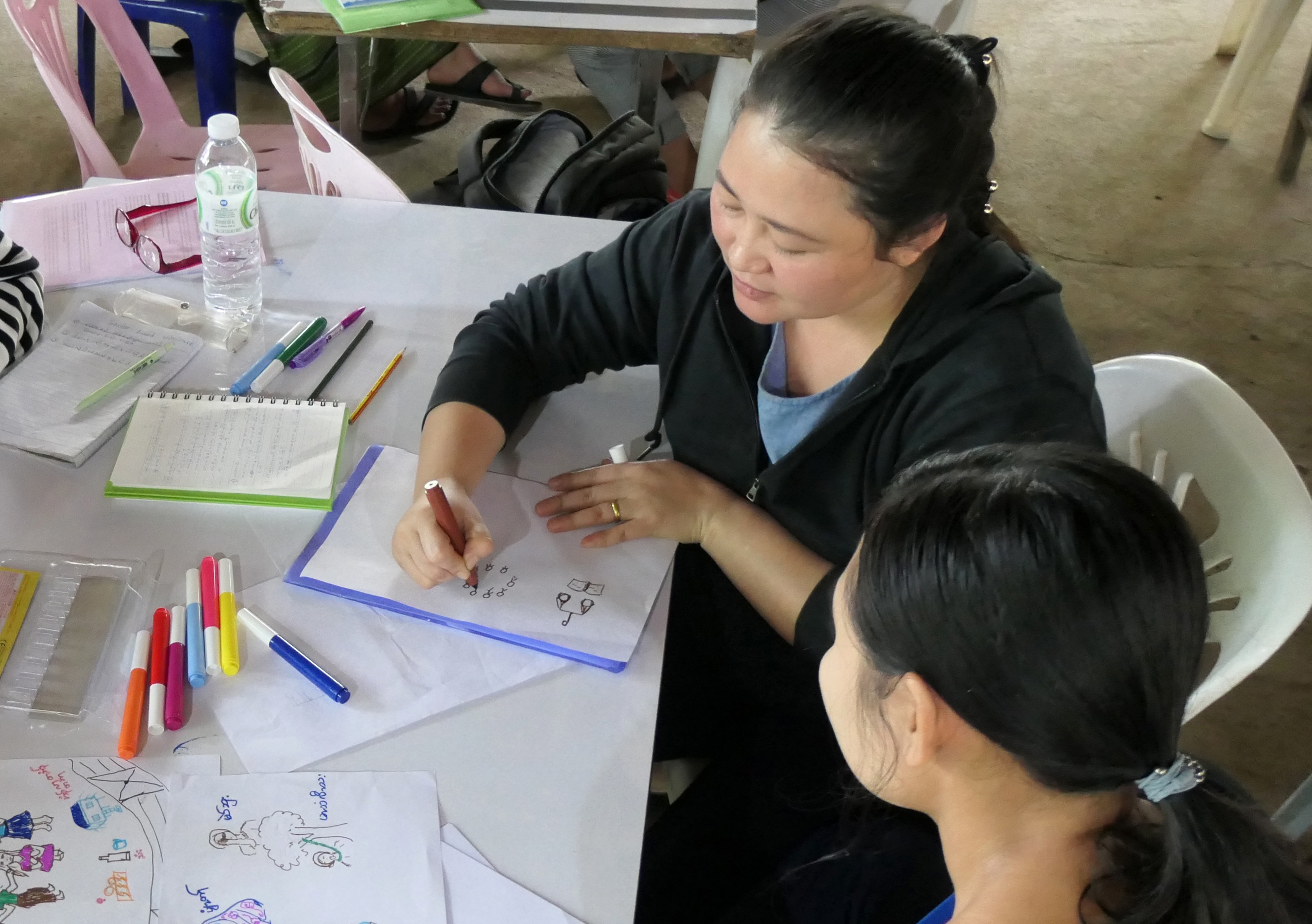
Refugee women in Malaysia participating in a workshop with the researchers. Photo: Eileen Pittaway, Linda Bartolomei
It comes down to real-world impact
The researchers are motivated to create real change through their research: “We both come from the mindset that if you are going to work with some of the most vulnerable people in the world, if you’re not going to have a good impact, then you shouldn’t be doing it – it’s ethically wrong to do this, I think,” A/Prof. Pittaway says.
A/Prof. Pittaway first became aware of the experiences of refugee women and girls in a 1989 research project examining the experiences of women refugees resettling in Australia. The project revealed the alarmingly high prevalence of experiences of sexual and gender-based violence, she says.
“80 per cent of the 300 women I interviewed had been raped or severely sexually abused.” This has driven her research agenda ever since.
Her advocacy work for refugee women and girls was recognised early on with an accreditation from the UN as a lobbyist. This allowed her and her research partners to lobby on a global scale at a range of UN meetings across various UN bodies.
“To be able to go from the field – because we spend a lot of time in camps and city slums where the refugees are – and then go straight from there to the United Nations and talk to heads of governments, organisations have been invaluable,” A/Prof. Pittaway says.
Dr Bartolomei came to UNSW in 1997 to pursue a Master’s degree. Prof. Pittaway supervised her thesis on the experience of resettled refugee women seeking employment in Australia, beginning a career-long partnership.
“Eileen comes from a social policy background, [and] I come from social work,” Dr Bartolomei says. Their cross-disciplinary approach is informed by critical policy studies, social theory, human rights, feminism and community development.
“We’re not interested in just understanding the impact of problems, and trying to patch up those problems. We’re interested in really understanding what are the root causes, what are the structural causes of why refugee women and girls continue to face rape and abuse on a daily basis?
“A lot of those answers lie in policy change, in law change, [and] most importantly and critically, in the change of attitudes and discourses about refugee women.”
For example, refugee women were historically described as a vulnerable minority group and services were structured to address this identity, she says. “In fact, refugee women have always been a majority of any refugee population, and they are far from inherently vulnerable.”
However, because of the many structural barriers and discriminations they face, they are often placed in very vulnerable situations, she says.
‘Survival sex’ and the significance of language
The power of language and discourse to affect change can also be seen in their campaign to reframe sex work in refugee settings, an achievement both count as a career highlight.
“An awful lot of refugee women are forced to sell sex to survive, to get food for their children and it was always referred to as ‘prostitution’ in all formal documents. And the minute you use the word ‘prostitute’, that woman is labelled as bad, immoral and of lesser worth.
“So we fought and we argued in the UN to only use [the term] ‘survival sex’. Women are forced to take part in survival sex. And we argue they need gold medals, not stones thrown at them, because what would you do if your child was starving and the only way you could feed your child was to have sex with a man?
“And we fought and we won that one.”
As a result, UNHCR released a public statement that they would only use ‘survival sex’ in their documents. A/Prof. Pittaway was then invited to present on the issue at an international resettlement review meeting hosted by the United States at UNHCR in Geneva.
At this time, anyone with a criminal record or a history of prostitution was exempt from receiving a green card, which meant refugee women who had been forced into survival sex were not given the opportunity to resettle in the US.
“Because of the work we’ve done on survival sex, they changed that rule,” A/Prof. Pittaway says.
Gender auditing the Global Compact of Refugees
In a parallel but linked project, the researchers audited key meetings leading up to the drafting of the Global Compact on Refugees, addressing its consideration of gender. “Even when gender issues are discussed at UN meetings, they’re often just not included in the report or the outcomes document,” Dr Bartolomei says.
When the UNHCR supported the proposal, “we said, ‘Great. If you want us, we want five refugee women on the team as well'”, A/Prof. Pittaway says. “‘We want women from the five world regions to be actively working with us on documenting and drafting the report.’
“And that’s the model [of participatory research] that we’ve been using for the last couple of years.”
The UNHCR has since invited them to “gender audit” key UN meetings leading up to the 70th anniversary of the Refugee Convention in 2021.
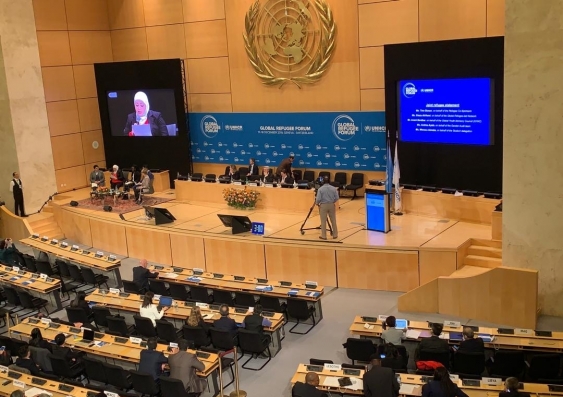
Tennah Kpaka, a refugee woman from Sierra Leone, read the combined NGO statement at UNHCR, Geneva in 2004. Photo: Eileen Pittaway, Linda Bartolomei
In their own voices
A/Prof. Pittaway and Dr Bartolomei have worked with many refugee groups over extended periods of time with those on the Thai/Burma border since the mid-1990s and those in Bangladesh since 2007.
This has helped them build a depth of contextual understanding and strong relationships with multiple partners at different levels. These relationships have proved invaluable in helping steer international refugee rights dialogues, they say, which is why it was so shocking that refugees weren’t automatically involved in international UN meetings until recently.
In fact, there were no refugees, and very few activist NGOs, present at A/Prof. Pittaway’s first UNCHR meeting.
Supported by their research team, students and friends, A/Prof. Pittaway and Dr Bartolomei fundraised for the first refugees to attend. In 2004, Tennah Kpaka, a refugee woman from Sierra Leone, participated at a key UNHCR meeting. She was the first refugee to read the combined NGO statement at a UNHCR meeting.
“There had been a few other [UNHCR] meetings where refugees had been invited for special events, but this was the first time that a refugee woman had come to work as part of the NGO team … and that has taken off,” A/Prof. Pittaway says.
Now many refugees attend these meetings, and a number of refugee-led organisations have been formed.
The researchers have also made short documentary films in which refugee women describe the impact of abuse they have faced and share their resilience and suggested solutions.
“We’ve been given space to play them [at UN meetings] – a three-minute film of 10 women saying, ‘and then they raped me’. It really strips away the protection that people say, ‘Oh, they don’t talk about that. We mustn’t shame them’.
“We’ve got three minutes of absolutely hitting you on the forehead with it … [so the response is often] ‘well, perhaps we better acknowledge it’. So, we’ve seen those shifts happen as well.”
The films have been influential vehicles for having their academic work recognised. Reciprocal Research, a short film developed in partnership with refugee women’s groups, provides an example of their research in action.
The road towards progress is less linear
Progress over the years has been irregular and inevitably shaped by political agendas. While the rise of neoliberalism and competition policies has had a “negative impact” on settlement service provision and community-led responses, the researchers have nonetheless seen significant progress when it comes to the recognition of the gendered impacts of the refugee experience.
There has been a marked increase in targeted service provision for women in Australia. Early torture and trauma services, for example, focused on men’s experiences.
“It was thought that if a woman was traumatised it was because their husband, brother, father, son had been tortured. Because rape and sexual abuse wasn’t even considered as torture or that traumatising,” she says.
Now STARTTS, the NSW Service for the Treatment and Rehabilitation of Torture and Trauma Survivors and its state equivalents, runs programs for women and men, and refugees have greater access to translators and other targeted services.
“Things have improved dramatically. It doesn’t mean that what’s happening to people now isn’t pretty horrendous, but there are good services now that just weren’t there before.”
Their work has also had significant policy and practice impacts on the work of UNHCR. They have developed and delivered training materials, including identifying and responding to women at risk of sexual and gender-based violence, how to lobby at the UN and women’s leadership, as well as providing recommendations to international governments on how to interpret and incorporate UNHCR conventions.
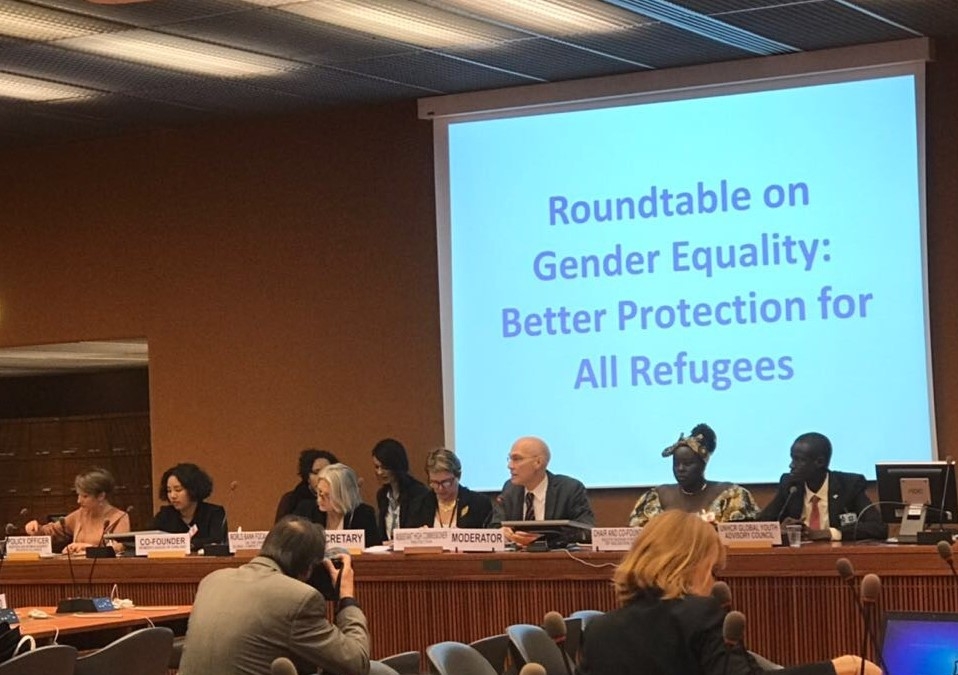
The Roundtable on Gender Equality: Better Protection for All Refugees at UNHCR, Geneva. Photo: Eileen Pittaway, Linda Bartolomei
Hearing from women whose lives they’ve changed
For both A/Prof. Pittaway and Dr Bartolomei, the satisfaction of seeing change occur is immeasurable.
“I mean, it’s really hard work. Sometimes, we’ll come back from a place and we’ve interviewed 200 women who told us the most horrendous rape and torture stories, it drains you, but the success is when things work and when the women respond,” A/Prof. Pittaway says.
“I was speaking at a conference a few years ago. And when question time came, a woman from Sudan put up her hand and she said, ‘I want to say thank you to Eileen and Linda. I’m here because they went to Kakuma [a refugee camp in North-west Kenya with a population approaching 200,000] and what they did there got us out’.
“Every now and again, someone will come up and just say thank you. We’re here because of you. Your work has helped women. Thank you because you’ve given us a voice. And although we haven’t done – I mean, there’s a lot of problems still – but it’s very satisfying when those things happen.”






